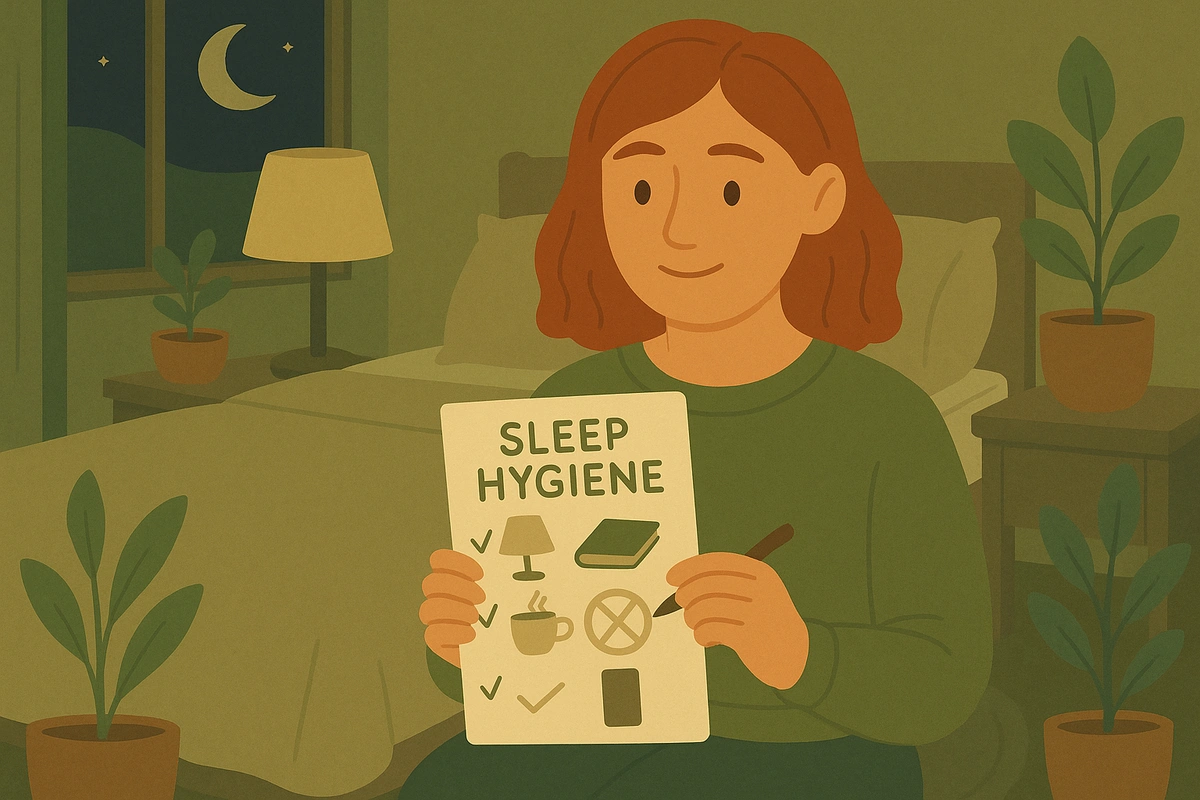A sleep hygiene checklist provides a simple roadmap to better sleep by establishing consistent, evidence-based bedtime practices that calm your anxious mind and reset your nervous system, creating the foundation for both emotional healing and physical restoration each night.

Establishing proper sleep hygiene involves creating and maintaining bedtime routines and environmental conditions that support your body's natural sleep-wake cycle. Think of sleep hygiene like brushing your teeth - it's a daily practice that prevents problems and maintains health, but for your nervous system rather than your dental health.
Sleep disturbances affect approximately 50% of individuals with anxiety, creating a challenging cycle where anxiety disrupts sleep and poor sleep worsens anxiety. Good sleep hygiene breaks this cycle by providing your brain and body with predictable signals that it's time to transition from the alertness of day to the restoration of night. When you follow consistent sleep practices, you're essentially training your nervous system to recognize bedtime cues and respond by releasing calming hormones like melatonin while reducing stress hormones like cortisol.
Sleep hygiene works by supporting your body's natural circadian rhythm system, which is controlled by a cluster of neurons in your brain called the suprachiasmatic nucleus. Think of this as your body's master clock that coordinates when you feel alert versus sleepy throughout the 24-hour cycle.
When you follow consistent sleep practices, you're essentially giving this biological clock clear, predictable signals about when it's time to be awake and when it's time to sleep. This consistency helps optimize the production and timing of sleep-promoting hormones like melatonin and the reduction of activating hormones like cortisol.
Research shows that sleep disturbances can worsen anxiety symptoms, while good sleep helps your prefrontal cortex - the brain region responsible for emotional regulation and rational thinking - function more effectively. When you're well-rested, you're better able to manage stress, make good decisions, and regulate your emotions.
The routine aspect of sleep hygiene is particularly important for anxious individuals. Predictable bedtime rituals help calm an overactive nervous system by providing structure and reducing uncertainty about sleep. This can help interrupt the cycle of "sleep anxiety" where worry about not sleeping actually prevents sleep from occurring.
Sleep hygiene also works by addressing multiple factors that can interfere with sleep simultaneously. Rather than relying on a single intervention, it creates an environment and routine that optimize all the conditions necessary for restorative rest.
"I lie awake worrying even when I follow my routine": This is common with anxiety disorders. Try the "worry dump" technique - write down concerns in a journal 2-3 hours before bed, then remind yourself they're recorded for tomorrow. Consider adding meditation or deep breathing to your routine.
"I can't fall asleep at my designated bedtime": You may be trying to go to bed before your body is ready. Gradually shift your bedtime earlier by 15 minutes every few nights, and ensure you're getting enough natural light and exercise during the day to promote natural sleepiness.
"My work schedule makes consistency impossible": Focus on the elements you can control - maintaining the same pre-sleep routine, optimizing your sleep environment, and keeping the same number of hours between sleep even if the times vary.
"I feel worse when I track my sleep": Some people become anxious about sleep metrics. If tracking increases anxiety, focus on how you feel rather than numbers, or stop tracking altogether while maintaining good sleep hygiene practices.
"My partner's schedule conflicts with mine": Compromise where possible, but prioritize your sleep health. Use eye masks and earplugs if needed, consider separate bedrooms temporarily if sleep quality is severely affected, or work together to find a schedule that works for both.
"I sleep well but still feel tired": This could indicate a sleep disorder like sleep apnea, or that your sleep environment needs optimization. Consider consulting a healthcare provider if good sleep hygiene doesn't improve daytime energy levels.
"I can't stop using my phone before bed": Start by moving your phone to another room and using a traditional alarm clock. If you must keep it nearby, use airplane mode and keep it in a drawer. Replace phone activities with equally engaging but calming alternatives like reading or puzzles.
"My anxiety medications affect my sleep": Work with your healthcare provider to optimize medication timing and dosing. Some anxiety medications can be sedating while others may be activating - timing and type matter for sleep quality.